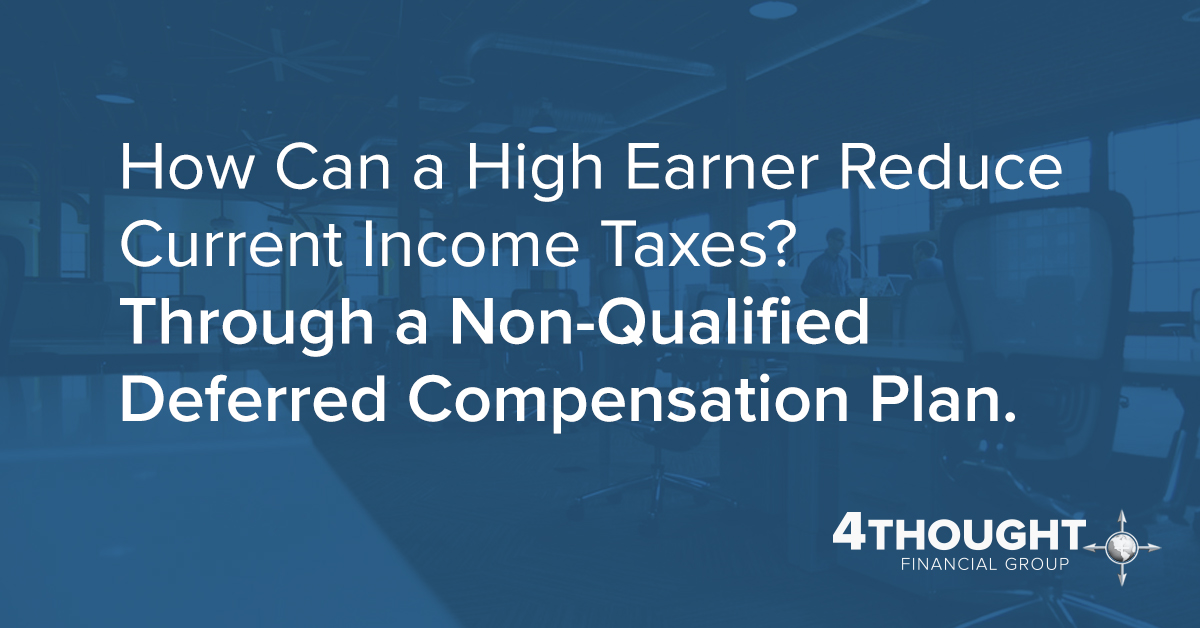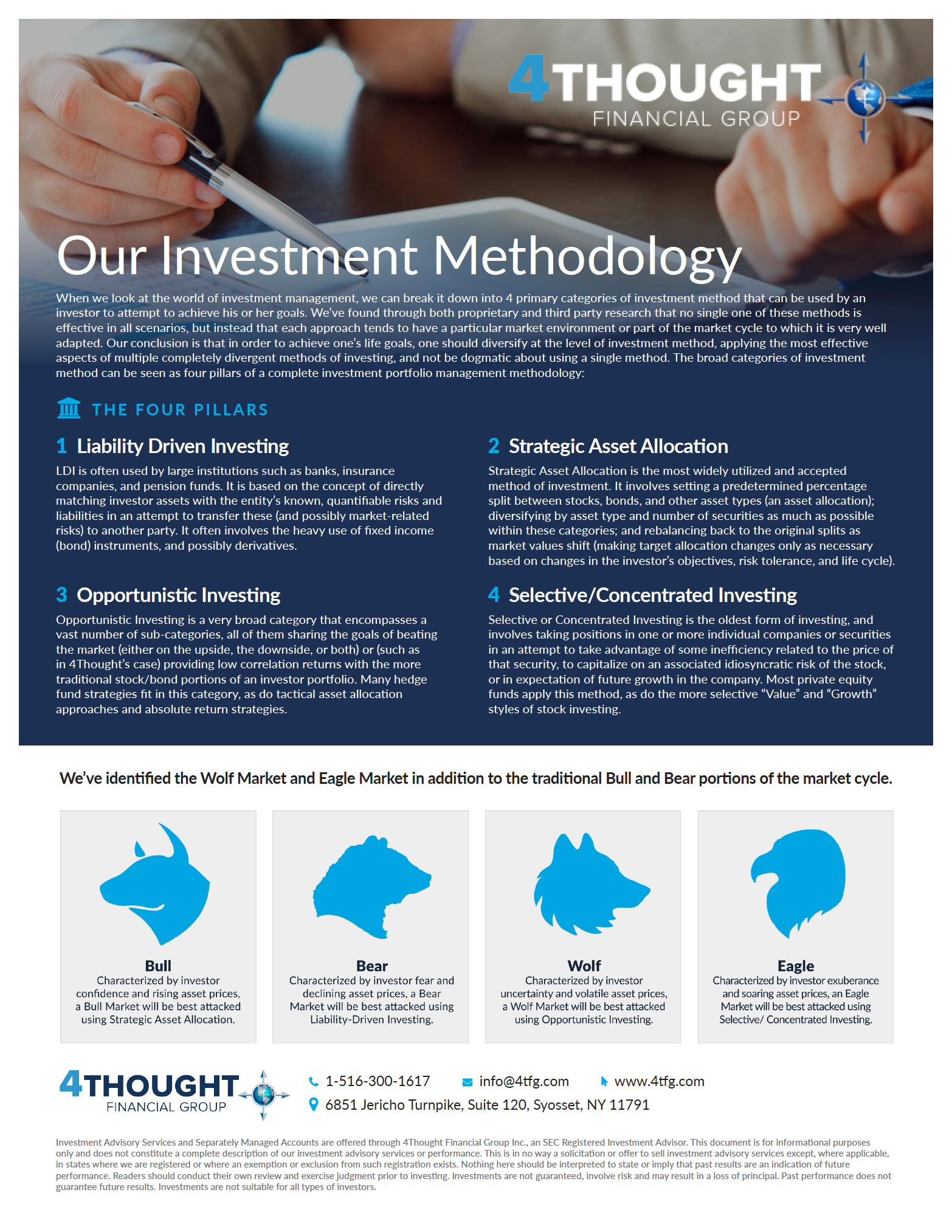

4Thought Financial Group's Unique Investment Methodology
"In order to achieve life goals, one should diversify at the level of investment method, applying the most effective aspects of multiple, completely divergent methods of investing, and not be dogmatic about using a single method"
Learn more about the 4Thought Financial Group Investment Methodology
There are a variety of ways for high earners to reduce their current income tax liabilities, but they’re not all as obvious as taking your available deductions and maxing out your 401k contributions. After your 401k contribution has been maxed out for the year, one possible solution to further reduce current taxation is the Non-Qualified Deferred Compensation plan (NQDC).
What Is a Non-Qualified Deferred Compensation (NQDC) Plan?
It’s a formalized promise by an employer to pay an important employee a portion of their income at a predetermined point in the future, instead of paying it to them right now.
Advantages of NQDC Plans
The advantage of the NQDC plan for an employee that has current earnings significantly greater than their annual living expenses is that it avoids the need to pay taxes on the excess income until a prescribed future date. It’s a method of deferring taxable income, but it does not involve taking a tax deduction on the deferred amount, because technically no income has been received at all (until the later date). The employee’s elected income deferral into an NQDC plan has no upper limit like a 401k plan does (this is according to IRS limits, but the employer’s plan may have a maximum contribution to an NQDC), so if the employee has already maxed out their 401k contribution, the NQDC may allow them to defer an unlimited amount above and beyond the 401k contribution limits each year. The date to receive the income must be specified in advance by the employee (within IRS rules and any limitations imposed by the employer’s plan) in order to avoid current taxation (this is known as the “Doctrine of Constructive Receipt”). The future date is usually the employee’s planned retirement date.
Disadvantages
A main disadvantage for the employee is that once they have chosen their predetermined future date to receive the income, there is no chance to get that money out in whole or in part on a prior date, nor is there any ability to take a loan from the plan for short-term use purposes like there is in a 401k plan. So any deferral to an NQDC plan should be done with a degree of certainty that the income will not be needed in the interim period.
Furthermore, and importantly, once the deferral election has been made, the NQDC participant has effectively subjected their future income to the credit or guarantee of the employer. This means that if the company goes out of business in the interim period, the employee may never receive the promised future income (nor is funding for the plan protected from the company’s creditors). Still, for some high-income earners, this risk is worth taking in order to potentially substantially reduce their current income tax bill.
NQDC Plans Benefit Employers, Too.
There are significant advantages to the NQDC plan for employers, also. Offering the benefit is a way for the employer to attract and retain important personnel and to compete for new high-level talent. It’s a form of so-called “golden handcuffs.”
If your employer has a Non-Qualified Deferred Comp plan and you are eligible to contribute to it, this probably means that your employer thinks you’re a very important part of the organization. Your employer does not have to offer this plan to everyone. Under the law, they have the ability to discriminate as to exactly which individuals or groups of employees they want to offer this benefit (unlike with a “Qualified Plan” such as a 401k, Profit Sharing, or Defined Benefit Plan—each of which has strictly regulated predetermined rules as to which employees get access and how much must be contributed by the employer for each participant).
A downside for employers is that they have to come up with a way to fund and account for the future liability of the income payment to the employee. But there is some flexibility in terms of how the “promise” can be structured for the individual important “key” employees and in terms of what can be used as the employer’s funding vehicle to make good on the promise of future income to the employee.
Corporate NQDC Plans
In large plans, the investment allocation decision may be left to the individual employee within the limits imposed by the plan. Large corporate NQDC plans often offer a mutual fund-based selection of investment vehicles selectable by each deferring employee participant, which determines how their allocation of deferred income (which is technically still the company’s asset) may grow during the period before receipt. Alternatively, if the employer compensates employees with shares of company stock (often in the form of “Restricted Stock Units” or RSUs), the employee may have the option of deferring the receipt of these stock shares into the NQDC plan, thereby avoiding the immediate income taxation of the shares that would otherwise normally take place when the RSUs become vested.
For C-level executives and other upper management employees who often receive a high proportion of their total annual income as stock shares, this is potentially a valuable alternative means of reducing current income taxation. Depending on the plan, the employee may also be able to first defer the RSU income, and then sell the company stock and reinvest it in a more diversified mutual fund portfolio within the NQDC plan, thereby reducing their concentrated portfolio exposure to a single company stock while simultaneously taking advantage of lower current taxation.
NQDC Plans for Small Businesses
While many large publicly listed corporations often offer NQDC plans for a select group of upper level employees and officers, there are potentially even greater benefits to the employer for small privately held companies. One funding vehicle sometimes used with smaller companies to compensate key personnel is life insurance. Such personnel are often officers and major shareholders of the company.
By purchasing a permanent life insurance contract such as “whole life” on the life of a very important employee, a small corporation can potentially kill two birds with one stone. The corporation is named as the owner and beneficiary of the policy. This effectively creates “key man” life insurance (and the associated death benefit) that will allow the company to hire a new highly skilled employee in the event of the death of the current “key man.” During the employee’s lifetime, the whole life insurance policy will build up cash value, which can be used to provide the deferred compensation to the employee in a lump sum in the future (if the employee doesn’t die) at their predetermined receipt date. Alternatively, using this funding vehicle, the promise of income to the employee can be structured to equate to: “We’ll pay you an income of $X starting X years in the future, and if you die, we’ll still continue to pay your spouse or beneficiaries for at least X years.” Such a promise is not too different from a conventional pension. In either situation the employee never actually owns the life insurance policy at all, but the employing company uses it as a vehicle to fund the known future liability (the promised income payment to the employee).
Is a NQDC Plan Right for You?
While the Non-Qualified Deferred Compensation plan is not for every employer or employee, it can be very useful as a means to defer a large portion of taxable income and reduce current income taxation, as well as to attract and retain highly skilled personnel. If you believe this may be right for you, be sure to consult on the details of your situation and the tax ramifications with your financial advisor and your accountant before proceeding.
4Thought Financial Group
Are you a high earner looking for ways to reduce your income taxes or an employer looking for a way to provide retirement benefits only to key employees? A Non-Qualified Deferred Compensation Plan is one potential solution. 4Thought Financial Group can help you determine if this makes sense for you. Contact Us here.








Leave a Comment